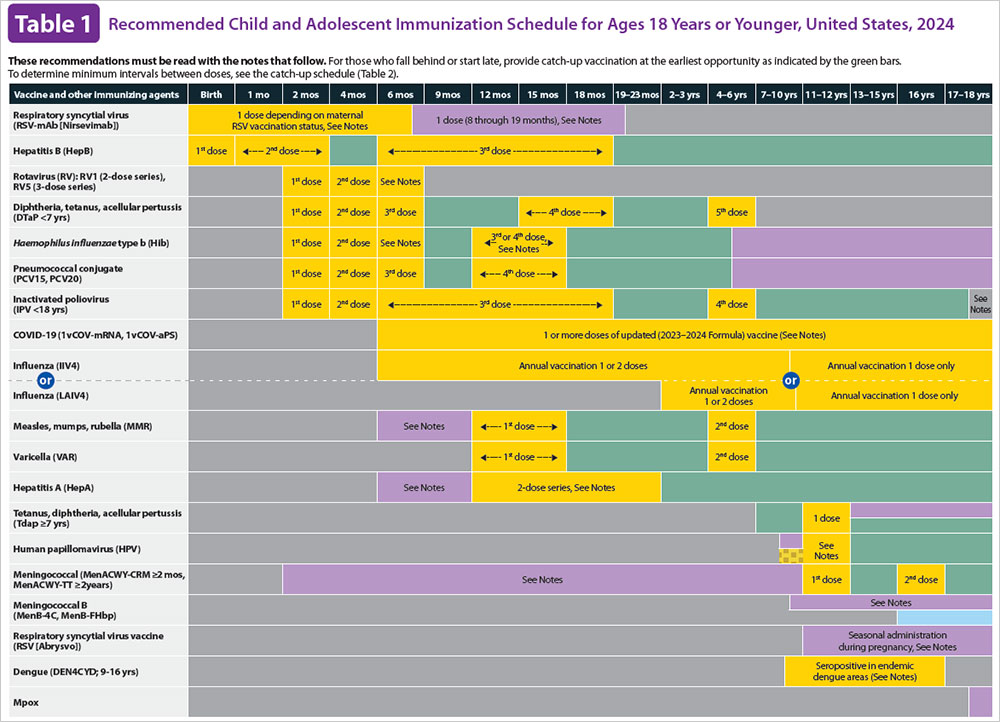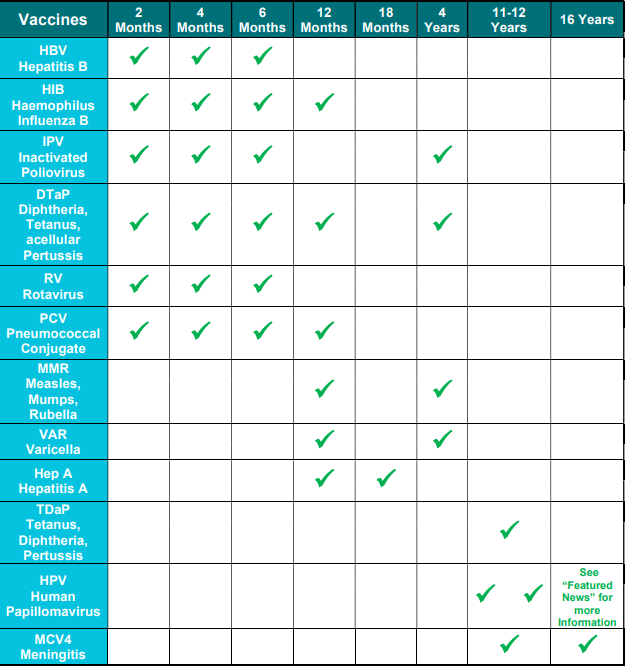Immunization Schedules: Your Essential Guide to Timely Shots
- Update Time : Sunday, December 15, 2024

Keeping track of immunization schedules is crucial for maintaining health. Vaccines protect against harmful diseases.
An immunization schedule outlines the right time for vaccines. It takes into account age and health history. This plan helps ensure everyone gets the protection they need, when they need it. Vaccinations are a key part of public health. They prevent the spread of contagious diseases.
From infants to the elderly, everyone needs to follow an immunization schedule. It’s not just for kids. Adults need shots too, to stay healthy. This guide helps you understand when to get vaccines. It’s important for staying healthy at every stage of life. You’ll learn which vaccines are necessary and when to get them. This way, you can make informed choices about your health and the health of your loved ones.

Credit: www.cppdocs.org
Introduction To Immunization Schedules
Keeping track of immunization schedules is key to good health. These schedules guide us on when to get vaccines. They help protect us from serious diseases. Let’s dive into the world of immunizations and understand their critical timing and development.
Importance Of Timely Vaccinations
On-time vaccinations save lives. They prevent disease outbreaks. Kids, adults, and the elderly need them. Every shot matters. Missing one can be risky. It’s not just for you. It’s for everyone around you too. Let’s stay safe together. Get your shots on schedule.
Brief History Of Vaccine Development
Vaccines have a long past. It began with smallpox. Edward Jenner used cowpox material in 1796. This was to fight smallpox. It worked. Since then, science has made many vaccines. Now, we fight lots of diseases. We live longer and healthier lives because of vaccines.
Key Vaccines For Infants And Children
Vaccines protect kids from diseases. This guide talks about important vaccines for babies and kids. Let’s keep them safe and healthy.
Hepatitis B And Polio Shots
Hepatitis B vaccine fights liver disease. Babies get their first shot at birth. They need more shots later. Polio vaccine protects against a virus that can cause paralysis. Babies get several doses starting at 2 months old.
DTAP, Hib, And Pneumococcal Vaccines
DTaP vaccine guards against diphtheria, tetanus, and whooping cough. Hib vaccine fights bacteria that can cause serious problems, like meningitis. Pneumococcal vaccine protects against infections like pneumonia. Kids get these vaccines in several doses during their first two years.
MMR And Varicella Immunizations
MMR vaccine protects against measles, mumps, and rubella. Varicella vaccine prevents chickenpox. Kids usually get these vaccines when they are 1 year old and again before starting school.
Adolescent Vaccine Recommendations
Protecting adolescents from preventable diseases is critical. Vaccine schedules provide a timely approach to immunity. Understanding these recommendations ensures teens stay healthy. This section covers key vaccines for adolescents.
HPV And Meningococcal Vaccines
HPV vaccines shield against various cancers. Teens typically receive this vaccine at age 11 or 12. The series includes two shots over six to twelve months. Teens older than 15 need three shots over six months.
The meningococcal vaccine defends against meningitis. It’s crucial for teens entering high school. The first dose is at 11 or 12 years, with a booster at 16. This vaccine is key for college-bound teens.
Tdap Booster Shots
The Tdap booster protects against tetanus, diphtheria, and pertussis. Teens get this shot once at age 11 or 12. Pertussis, or whooping cough, can be severe. The Tdap booster is vital for maintaining immunity.
Adult Vaccination Protocols
Vaccines aren’t just for kids. Adults need them too. It’s the best way to protect against disease. Every year, the rules for adult shots may change. It’s smart to know what shots you need. Here’s a guide to help adults stay up-to-date with their vaccines.
Seasonal Influenza Shots
Flu shots are a yearly must. They keep you safe from the flu. The best time to get one is before flu season starts. This shot changes every year. It matches the flu viruses going around. All adults should get one. It’s extra important for those over 65 or with health issues.
Shingles And Pneumonia Vaccines For Older Adults
Shingles hurt and can cause long-term pain. A shingles vaccine can stop this. You need two doses, two to six months apart. Are you 50 or older? It’s time to get this shot. Pneumonia is another big risk for older adults. There’s a vaccine for that too. It can save lives. Talk to your doctor about when to get these shots.
Travel Vaccines And International Immunization
Planning a trip abroad? Know about Travel Vaccines and International Immunization. These vaccines protect you from diseases in other countries. Let’s talk about which vaccines you might need.
Yellow Fever And Typhoid
- Yellow Fever: Common in Africa and South America. A must-have vaccine for travelers.
- Typhoid: Can catch from contaminated food or water. Important for travelers to Asia, Africa, and Latin America.
Vaccines for Yellow Fever and Typhoid are key. They keep you safe on your journey.
Hepatitis A And Rabies Precautions
| Vaccine | Why It’s Needed | Where It’s Common |
|---|---|---|
| Hepatitis A | From food or water | Worldwide |
| Rabies | From animal bites | Asia, Africa |
Hepatitis A vaccine is a must. Rabies vaccine is wise if you’ll be near animals.

Credit: www.cdc.gov
Vaccine Safety And Efficacy
Vaccine Safety and Efficacy is a critical aspect of public health. Vaccines undergo rigorous testing to ensure they are safe and effective before reaching the public. Understanding the process and addressing concerns is key to building trust.
Understanding Vaccine Trials
Vaccine development involves several stages. Initial trials test safety and ability to provoke an immune response. Success leads to larger studies assessing effectiveness and side effects. Only safe, effective vaccines gain approval.
Addressing Common Concerns And Myths
- Vaccines are thoroughly tested for safety.
- Side effects are usually mild and temporary.
- Severe reactions are extremely rare.
- Vaccines do not overload the immune system.
Managing Vaccine Side Effects
Vaccines protect us from diseases. But sometimes, they cause side effects. Knowing how to manage these is important. This section provides helpful tips.
Common Reactions And Remedies
Side effects from vaccines are usually mild. They show the body is building protection. Common ones include:
- Arm soreness: Apply a clean, cool, wet cloth. Move your arm around.
- Fever: Drink lots of fluids. Wear light clothing.
- Tiredness, headache, muscle pain: Rest and take it easy.
These reactions are normal. They often go away in a few days.
When To Seek Medical Attention
Sometimes, reactions need a doctor’s care. Look for these signs:
- High fever: A temperature above 102°F (39°C).
- Difficulty breathing: Trouble breathing is a serious sign.
- Swelling: Swelling of the face and throat is not common.
If you see these signs, call a doctor right away. Quick action is key.
Staying Updated With Immunization Schedules
Keeping track of immunization schedules is vital for health. Vaccines protect against diseases. Life gets busy but staying updated is key.
Utilizing Health Records
Personal health records are tools for managing vaccine schedules. They list past shots and upcoming ones. Digital records offer easy access. Keep these updated for accuracy.
The Role Of Healthcare Providers In Reminders
Doctors play a big part in keeping patients on track. They send reminders for the next shots. This helps maintain an effective immunization plan. Trust your healthcare provider to guide you.
Legal And Ethical Considerations
Understanding the legal and ethical aspects of immunization schedules is crucial. These rules guide vaccine use. They balance public health with personal rights. Let’s explore how laws and ethics shape vaccine policies.
Vaccine Mandates And Exemptions
Vaccine mandates require shots for certain activities. School entry often has such rules. Exemptions allow skipping vaccines for medical, religious, or personal reasons.
- Medical exemptions protect those with health risks.
- Religious exemptions respect personal beliefs.
- Personal belief exemptions cover other non-medical reasons.
Each state decides its own exemption policies. This balance keeps communities safe and respects individual choices.
The Impact Of Herd Immunity On Public Health Policy
Herd immunity protects those who can’t get vaccines. It stops disease spread. Public health policies aim for high vaccine coverage. This keeps everyone safer.
When enough people are immune, outbreaks are less likely. This makes communities stronger against diseases. Public health experts use herd immunity to make vaccine rules.
They must ensure enough people are vaccinated. This protects the whole community.

Credit: www.chnola.org
Frequently Asked Questions
What Is An Immunization Schedule?
An immunization schedule is a systematic plan that outlines the timing of vaccines to be administered to people of different ages. It’s designed to provide immunity against diseases at the most effective times.
Why Are Updated Immunization Schedules Important?
Updated immunization schedules are crucial because they reflect the latest research on vaccine effectiveness and disease patterns. They ensure optimal protection against infectious diseases for individuals and communities.
How Often Should Children Be Vaccinated?
Children should be vaccinated according to the recommended immunization schedule from birth until they are 18 years old. The schedule includes specific times for each vaccine, often starting from the first few months of life.
Can Adults Benefit From Following An Immunization Schedule?
Yes, adults can benefit from following an immunization schedule. It includes vaccines for diseases like influenza, shingles, and pneumonia, which are particularly important for older adults or those with certain health conditions.
Conclusion
Staying up-to-date with immunization schedules is key to good health. It protects against diseases, from infancy to old age. Each vaccine plays a vital role. Your doctor can help plan the right time for each shot. It’s not just for kids; adults need updates too.
Remember, community health starts with individual action. So, keep track of your shots. Stay healthy, and help keep others safe too. Vaccines work. Let’s use them well. Your next step? Check your vaccine status. Together, we can fight illness effectively.


















Leave a Reply